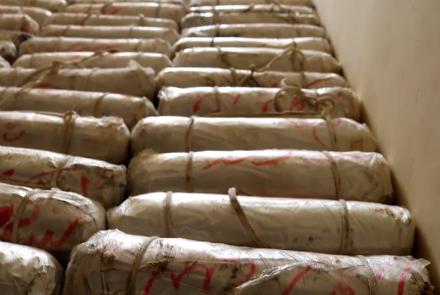The Counter Narcotics Justice Center (CNJC) on Sunday released its quarterly report and said in the first three months of this year officials arrested 230 people, including 13 women and two foreign nationals, on charges relating to smuggling of drugs, alcohol and illegal chemicals.
According to the report, CNJC also seized 32 tons of drugs, over 47kg of illegal chemicals and more than 47,000 liters ofalcohol in the first three months of this year.
“We have seized 856kg of heroin, over 3,800kg of morphine, over 6,400kg of opium, over 21 tons of hashish, and more than47,000kg of solid chemical materials,” CNJC spokesman Khalid Mowahid said.
The CNJC also said the anti-narcotics primary and appeal courts sentenced 179 people, including a woman, to prison after they were found guilty in 136 drug smuggling cases. These culprits all received sentences of between one and 20 years in prison.
“Among the arrested were 13 women and two foreign nationals and nine employees of (government) public services. Out of these people, 67 of them were trying to smuggle drugs to India and Saudi Arabia,” said Mowahid.
“More efforts should be done in this regard. The work of this organization (CNJC) is like catching the small fish, but the biggerfish free them again. The big smugglers should be arrested and brought to justice,” political affairs analyst Yunus Fakoor said.
According to the report, 91 arrests were made in Kabul and 33 in Nangarhar province. Other arrests were made around the country with the exception of a few provinces including Logar, Daikundi, Nuristan, Panjshir, Wardak, Sar-e-Pul, Paktia, Uruzgan, Kunar, Ghor, Ghazni, Faryab, Bamiyan and Badghis.
The Special Inspector General for Afghanistan Reconstruction (SIGAR) meanwhile said in a recent report that in 2017, poppy cultivation reached a new record high of 328,000 hectares.
In November, US and Afghan forces initiated airstrikes against drug labs in Helmand province, using new authorities included in the South Asia strategy. The US department of defense described the strikes as the start of a sustained air interdiction campaign to disrupt Taliban financial networks. However, given the ease of setting up drug labs, the campaign’s longer-term impact on narcotics remains uncertain, the report stated.
The report also noted that there is also the risk that air strikes could result in civilian deaths, alienate rural populations, and strengthen the insurgency.


